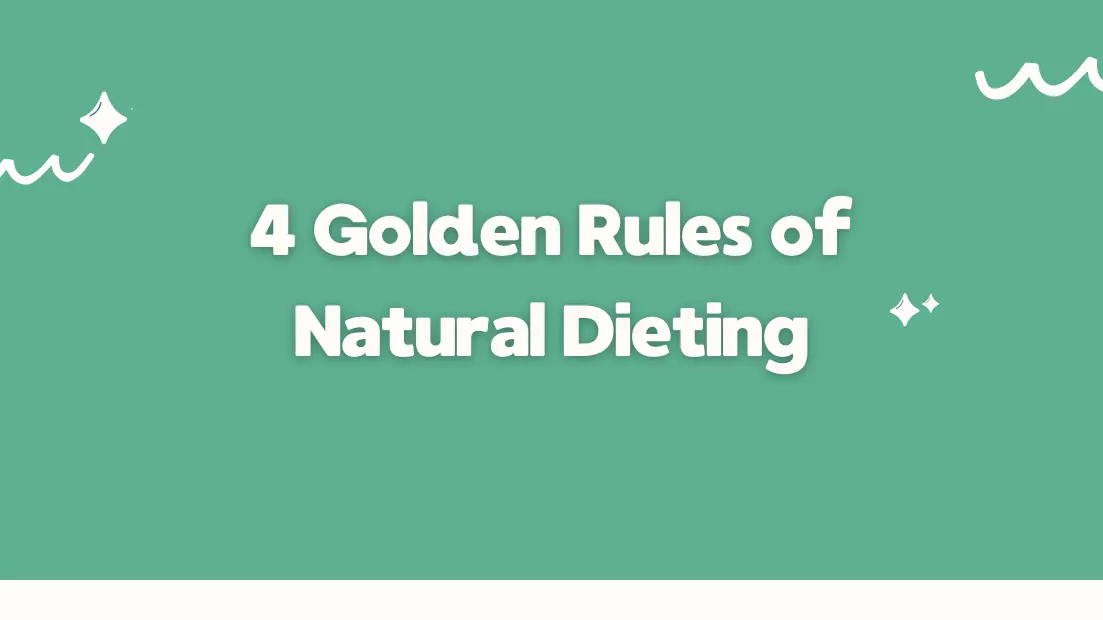
In the quest for a healthier lifestyle, many turn to dieting as a means to achieve their fitness goals. While there are countless diet plans available, the concept of Natural Dieting stands out as an approach that aligns with the body’s natural processes. Here are four golden rules to guide you on your journey towards a healthier and more natural way of eating.
1. Mindful Eating: The Foundation of Natural Dieting
Cultivate Awareness During Meals
Natural Dieting begins with cultivating awareness during meals. This involves slowing down and savoring each bite. Instead of mindlessly consuming your food, focus on the flavors, textures, and aromas. When you eat with awareness, you are more likely to recognize your body’s hunger and fullness cues, preventing overeating.
Listen to Your Body
Listening to your body is a crucial aspect of mindful eating. Pay attention to hunger and fullness signals. Eat when you are hungry and stop when you are satisfied. This intuitive approach to eating allows your body to regulate its food intake naturally, promoting a healthier relationship with food.
Create a Distraction-Free Environment
To fully embrace mindful eating, create a distraction-free environment. Turn off the TV, put away electronic devices, and focus on the act of eating. This not only enhances your eating experience but also helps you tune in to your body’s signals, fostering a more connected and conscious approach to nourishment.
2. Embrace Whole, Nutrient-Dense Foods
Prioritize Whole Foods
Natural Dieting emphasizes the consumption of whole, unprocessed foods. These foods are rich in essential nutrients and provide the body with the fuel it needs to function optimally. Prioritize fresh fruits, vegetables, whole grains, lean proteins, and healthy fats to create a well-balanced and nutrient-dense diet.
Say No to Processed Foods
Processed foods are often laden with additives, preservatives, and empty calories. By saying no to these items, you eliminate unnecessary chemicals and artificial ingredients from your diet. Opt for whole foods that support your overall health, providing a steady supply of vitamins, minerals, and fiber.
Hydrate with Water
Proper hydration is a cornerstone of Natural Dieting. Water is essential for digestion, nutrient absorption, and overall well-being. Make it a habit to drink an adequate amount of water throughout the day. This not only supports your body’s natural processes but also helps control hunger, promoting healthier food choices.
3. Balanced Macronutrient Intake
Prioritize Protein
Protein is a crucial component of a balanced diet, playing a key role in muscle repair, immune function, and satiety. Prioritize lean protein sources such as poultry, fish, beans, and legumes. Including protein in each meal helps maintain muscle mass and promotes a feeling of fullness.
Include Healthy Fats
Healthy fats are essential for brain health, hormone production, and nutrient absorption. Include sources of healthy fats, such as avocados, nuts, seeds, and olive oil, in your diet. These fats not only contribute to overall well-being but also enhance the flavor and satisfaction of your meals.
Choose Complex Carbohydrates
Opt for complex carbohydrates like whole grains, fruits, and vegetables. These carbs provide a steady release of energy, preventing blood sugar spikes and crashes. Choosing nutrient-rich carbohydrates supports sustained energy levels and helps you feel more satisfied between meals.
4. Practice Moderation and Enjoyment
Portion Control
Moderation is key in Natural Dieting. Practice portion control to avoid overeating and allow your body to process food efficiently. Be mindful of serving sizes and listen to your body’s signals to determine when you’ve had enough. This approach fosters a balanced relationship with food.
Treat Yourself Occasionally
Deprivation often leads to cravings and unhealthy eating habits. Allow yourself occasional treats or indulgences to satisfy cravings and prevent feelings of restriction. Enjoying your favorite foods in moderation contributes to a sustainable and enjoyable approach to Natural Dieting.
Celebrate the Joy of Eating
Eating should be a pleasurable experience. Celebrate the joy of food by savoring flavors, sharing meals with loved ones, and experimenting with new recipes. By cultivating a positive relationship with food, you enhance the overall enjoyment of your diet and support your well-being.
Conclusion
Natural Dieting is not a restrictive or fad-driven approach but a lifestyle that aligns with your body’s natural needs. By embracing mindful eating, prioritizing whole foods, balancing macronutrients, and practicing moderation, you pave the way for sustainable and long-term health. Remember, the key to success lies in making gradual and lasting changes that contribute to a healthier, happier you.



